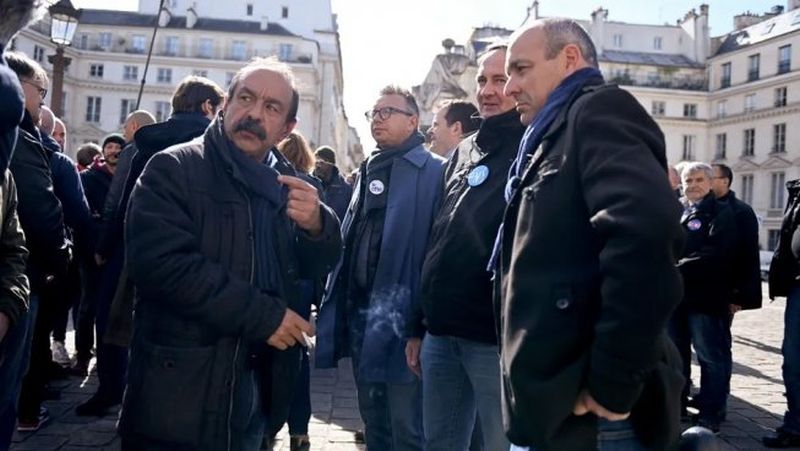
Since the presidential signing of the decree to launch the unpopular pension reform, police repression has intensified. But while the violence of the repressive forces rains down on the demonstrators and the threat of imprisonment and fines for the strikers increases, the national inter-union has not even issued a statement. Faced with state repression, the inter-union must break its silence, denounce the police repression and lead a broad campaign of support.
Clubs, tear gas, police arrests and searches of strikers -an authoritarian mechanism that the French State has for the workers to return to their posts. The requisition mechanism threatens strikers with six months in jail and a 10,000-euro fine if they refuse to return to their jobs.: this is the daily life of the protesters since the approval of the pension reform through the undemocratic article of the French constitution, the 49.3. The repression is unleashed to prevent anger from spreading and to root out the nascent radicalization (this despite the absence of inter-union calls), seeking to terrorize all those who continue to demonstrate every day.
The number of people arrested during the demonstrations is enormous: on Thursday night, 310 people were arrested, 258 of them in Paris; on Friday, at least 61 people were arrested in Paris alone; on Saturday, 169 people were jailed, and 287 people were arrested again on Monday, March 20, the day of the vote of the motion of no confidence. In Paris, Elsa Marcel, a lawyer from the Paris Bar Association, told us that “all the cells are full, we are in the same situation as during the movement of the Yellow Vests.”
Beyond the number of people detained, there are beatings with batons, the systematic use of tear gas and deterrent grenades, chokeholds and water cannons. To the point that situations of extreme violence continue to be denounced. Gendarmes holding a father and his young son in Chatelet, a protester knocked out with a punch in Paris, police from the Anti-Crime Brigades (BAC) beating a young man to the ground in Marseille, testimonies of police violence follow one another in the social networks.
It may interest you: Night of fury, spontaneous demonstrations and brutal repression throughout France
It may interest you: Night of fury, spontaneous demonstrations and brutal repression throughout France
Faced with this repression, various local unions have spoken out, such as the Isère union, which “strongly condemns this repression and demands that no legal proceedings be initiated”. However, for the moment, no communiqué from the national inter-union has appeared to denounce the repression. An even more serious scandal as when in December 2018, the inter-union did not hesitate to condemn the violence of the Yellow Vests in a statement that can at least be classified as shameful.
From this point of view, Laurent Berger (leader of the Democratic Confederation of Labor -CFDT-) stands out once again, since he was quicker to denounce the violence of the protesters than to denounce the repression that is falling on the entire movement. Laurent Berger told Libération on Sunday that “Violence generally comes from uncontrolled groups, from spontaneous movements. They are not tolerable, whether physical or symbolic. What we fear is, once again, that anger is instrumentalized. Either for political purposes, or with violence only to create chaos”. After having distanced himself from the renewable strike of the waste collectors and having denounced his own unionists after a symbolic action in Dijon, the “chief” of the CFDT is once again opposed to any hardening dynamics of the movement.
On the part of Philippe Martinez (the General Secretary of the General Confederation of Labor -French CGT-), if the tone is different, it is above all inaction that prevails.
Interviewed on Boursorama (a French financial portal), the CGT leader began by saying “I have seen a certain number of images that are not acceptable”. Before proceeding: “Faced with these demonstrations, there is an increase in the repression of the protesters that is not justified”. But despite this timid denunciation of the police violence that is accumulating, the CGT leadership did nothingeven against the searches that are taking place among the collectors and now the workers of the refineries. No systematic campaign has been launched: no call for rallies in front of the police stations, no demonstration against the repression. Images of police repression are not posted on the CGT’s twitter, making government terror invisible.
Faced with this repressive leap, The inter-union has the responsibility of leading a broad campaign against the repression that must combine the unconditional defense of the repressed with effective judicial and financial support, and the clear denunciation of police violence and those responsible, Macron and his government. This is a central task of the movement. Not only to defend all those who will be prosecuted for strike and demonstration actions, but also to increase the confidence of all mobilized workers and youth. Without this policy, there is a risk that the repression will end up discouraging and intimidating the millions of workers who have demonstrated in recent weeks.
Above all, at a time when the Macron government and its Prime Minister Elizabeth Borne are weaker than ever. The fight against repression is not just a matter of defense. Launching a systematic campaign of solidarity would be, in effect, a tool to unite sectors, in particular the youth, violently repressed in the spontaneous demonstrations, and the labor movement, hit by the requisitions and the police interventions in the pickets.
However, this implies breaking with the taboo maintained by the union leaders since the beginning of the movement: the refusal to politicize a protest that already raises questions that go far beyond the withdrawal of the reform.
As the comrades of Révolution Permanente, a member of the International Network of La Izquierda Diario, put it: “This rupture must be imposed at the base, coordinating the sectors to try to carry out initiatives against the repression, also -more broadly- to raise demands that go beyond the current narrow framework. Such a policy will be, in effect, a necessary condition to build a powerful movement to go on the offensive, and remove Macron, Borne and their reforms from the presidency.”
Philippe Martinez (CGT) and Laurent Berger (CFDT)
International / Spanish State Edition / France / Emmanuel Macron / Repression in France / Mexico Edition / CFDT / Pension Reform / CGT France / France Strikes / Social Security Reform in France / Pension Reform in France
Source: www.laizquierdadiario.com

